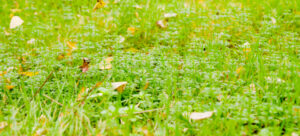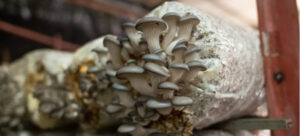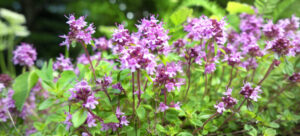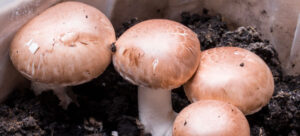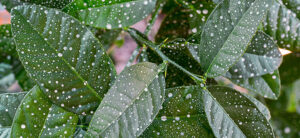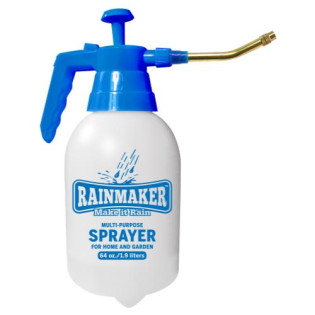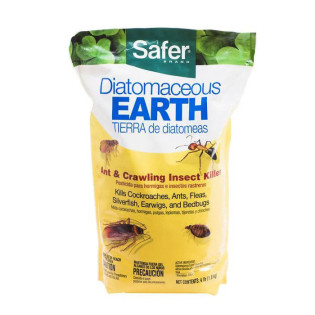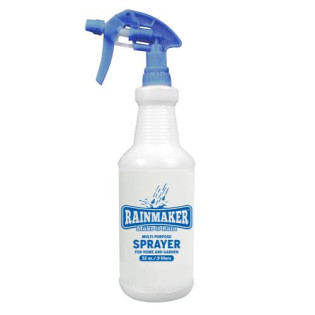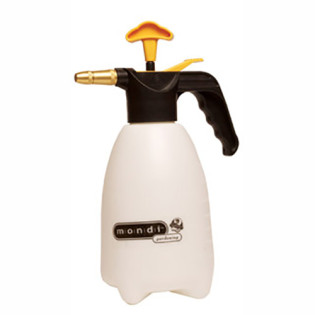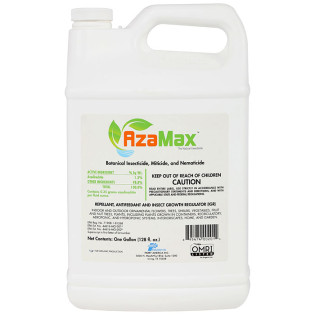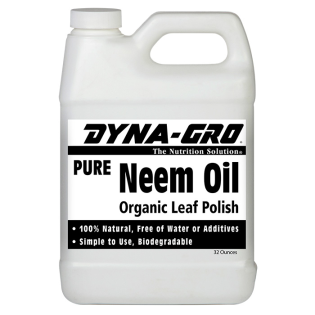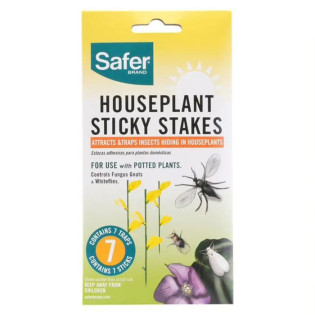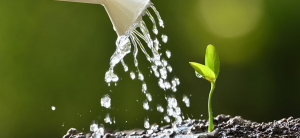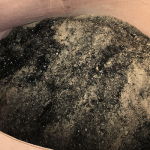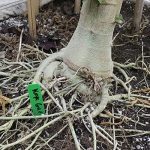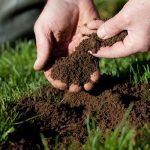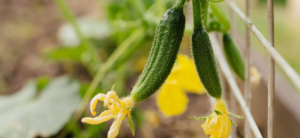
If you want to prevent pests from infiltrating your soil from the jump, you need to learn how to use diatomaceous earth in the garden!
This is one of the most underutilized pest prevention methods in the horticulture industry, and we believe the reason for this is lack of knowledge.
Because once you learn all the benefits of using diatomaceous earth in the garden, you’ll be implementing this approach for life.
We’ll cover all these in just a moment. And then we’ll actually teach you everything you need to know about how to use diatomaceous earth in the garden, and keep crawling insects at bay for good!
Let’s start by covering what exactly this mouthful of a phrase actually is.
What Is Diatomaceous Earth?
Diatomaceous earth is considered a form of grow media by some growers, but, t’s really more of an organic, proactive pest control method.
These look like small little white rocks, not too unlike growstones. But, they are far more complex than that. These chunks are essentially fossilized skeletons of diatoms.
Diatoms are microscopic, single-celled aquatic organisms. Interestingly enough, they are composed of a natural substance you may already be familiar with - silica.
If you are not already familiar, you should read up on our complete guide on silica for plants - it will explain all the benefits of this nutrient.
Let’s get back to the topic at hand though. Diatomaceous earth is mined all over the world, but particularly in the western parts of the US.
This is because lakes once covered the entire area, so there is no shortage of these fossilized skeletons!
Can You Use Diatomaceous Earth In Your Garden?
Like many different products used in the garden, such as hydrogen peroxide, diatomaceous earth is used for plenty of other things. So why do so many growers use this product in the garden?
It all comes down to the shape and sharpness of these little chunks of diatomaceous earth. The edges are incredibly sharp. So when insects try to crawl around in your media, they are sliced open. A good comparison for this product is that of tiny pieces of glass.
It will act as a deterrent for many pests, and they will leave the potted media in search of a smoother surface, one that is easier to navigate.
If the pests do not leave, they will simply be sliced open, and they will slowly dehydrate and eventually, perish.
What Are The Benefits Of Using Diatomaceous Earth In The Garden?
Because of what we just explained, there are some obvious benefits of using diatomaceous earth in the garden.
First and foremost, spreading this compound around your media will act as an incredibly effective pest prevention method.

If you are currently or preparing to implement an IPM (integrated pest management) strategy, you need to make this product a part of it.
But, it can also be used after the fact to treat an ongoing infestation in your media. If you didn’t properly prepare, you’ll definitely need to be reactive once you spot a problem.
You can sprinkle this product throughout your media. This will slow down any advancements made by the pests giving you grief, slowly weeding them out.
Part of the reason growers love using diatomaceous earth is because there is no chemical aspect to it. This means your pests will not be able to build up an immunity to it, unlike many pesticides!
What Bugs Does Diatomaceous Earth Kill In The Garden?
Another huge benefit of using diatomaceous earth in the garden is how versatile it is. Many pesticides only work on certain categories of pests, or in some instances, just one insect.
However, you can use this product to combat a myriad of different bugs. It kills just about any crawling insect. But, it works particularly well on soft-bodied insects. It easily cuts through their skin and dries them out.
Here are some of the most common bugs diatomaceous earth can kill in the garden:
- Caterpillars
- Aphids
- Spider mites
- Earwigs
- Snails & Slugs
- Beetles
- Flea
- Cockroaches
- Bed Bugs
These are some of the most common insects treated and prevented, but this list is not exclusive. Just about any bug you find in your media will be deterred or killed with diatomaceous earth! However, diatomaceous earth uses are not limited just to gardening - you can use it to kill bed bugs, kill cockroaches, and much, much more. Yes - that's right, diatomaceous earth kills bed bugs! This non chemical pesticide truly does it all.
Does Diatomaceous Earth Kill Ants?
One of the most common diatomaceous earth uses is to kill ants - does diatomaceous earth kill ants? These little critters can invade your garden as a result of another pests' presence. Or, they can infest your garden entirely on their own. Whichever the case, you need to eliminate them quickly!
The good news is yes - diatomaceous earth kills ants. This is an effective non-chemical pesticide for ants in particular. You can sprinkle it in your media or seek out the nearest anthill and coat their home! We'll talk more about how to apply diatomaceous earth later on.
Will Diatomaceous Earth Hurt Plants?
We’ve had nothing but praise for this product so far, but is using diatomaceous earth for plants safe when applied?
It’s nontoxic for not just humans and pets, but also for your plants. So on that front, it’s completely safe to use. It won’t affect the consumption of your flower or vegetables like some insecticides will.
With that said, it’s important you wear protective eyewear and potentially even a mask when applying this product. The dust can be incredibly irritating to your lungs and eyes.
Specifically regarding the safety of your garden, there is some concern from growers in regards to plant roots. But, rest assured that diatomaceous earth will not harm your plant roots. Unless, of course, you attempt to cut into them with the product! Simply leaving it in the media won’t harm your roots.
How Do I Put Diatomaceous Earth In My Garden?

Now, let’s talk about how to use diatomaceous earth in the garden. This is what you originally came here for, so let’s get into specifics!
We’re going to teach you how often you should apply this product, application rates, along with whether you should put it in your media or spray it on plants - an interesting tactic some growers have reported success with.
How Often Should You Apply Diatomaceous Earth in The Garden?
The magic in using diatomaceous earth in the garden is in the dry, sharp edges of the substance. This means when it becomes soggy, it loses effectiveness.
It will dry out after watering your plants, so this doesn’t mean you need to reapply it after each watering.
However, with that said, it should be applied every few weeks if you’re watering 3-4 times a week. If you are growing in an area with ultra-high humidity or frequent rain, this will mean you should reapply even more frequently.
How Much Diatomaceous Earth Do I Put In My Potting Soil?
Of course, your first step should be reading the label of your diatomaceous earth to determine how much you should apply to the soil. Not all products are created equal, and the manufacturer usually knows best.
If you’re looking to just apply this dry to your media, simply put on gloves, a dust mask, and eyewear, and sprinkle it around your soil. Get the base of your plant, along with the edges of the garden pot.
This the best approach if you have just watered your plants and the soil is still damp, or if it has just rained recently. The moisture will help hold the diatomaceous earth down.
Can You Mix Diatomaceous Earth With Water And Spray It?

One of the biggest questions growers have prior to using diatomaceous earth is whether it should be applied wet or dry. We mentioned that the product needs to be dry to work, and yet so many growers decide to mix it with water and spray it on their plants - how does this make sense?
While it’s true the product only works when dry, if you spray a fine mist of the right ratio onto your foliage or media, it will eventually dry and begin working.
While you can certainly sprinkle the product into your media dry, we actually recommend wetting the product and spraying it into your media, and even onto your plant if that’s where the bugs are.
The reason for this is the dust can easily miss the target during application. This is especially true if you’re in a grow room with circulation fans, or outdoors with a wind presence.
So, you can use a garden sprayer or atomizer and mix your diatomaceous earth at a rate of 2 cups per gallon of water. Be sure to constantly agitate the mixture, to prevent the product from settling at the bottom.
How Long Does It Take For Diatomaceous Earth To Work?
How long it will take the diatomaceous earth to work will depend on how active the pests in your media are. It also depends whether you applied the product wet or dry.
The more your infestation moves around across the product, the quicker it will be eradicated. And if you apply the product dry, it starts protecting your grow immediately.
However, if you apply it wet, you’ll need to allow it to dry out before it can start to work it’s magic.
What Is The Best Diatomaceous Earth To Use In The Garden?
We already mentioned that diatomaceous earth isn’t just used in the garden - there are specific forms of this product for use in the home, too. So, you’ll want to grab a product specifically formulated for use in the garden.
While there are plenty of options, we recommend you stick with a reputable brand that’s known for producing effective pest control products - Safer Brand.
Safer Brand Diatomaceous Earth - Bed Bug, Ant, and Crawling Insect Killer
Safer Brand Diatomaceous Earth - Bed Bug, Ant, and Crawling Insect Killer is a must have in every growers arsenal, especially if you grow outdoors where the most common garden pests make their home.
It’s a no-brainer investment into your grow, preventing and treating just about any pest you can think of.
It’s OMRI listed, meaning it's tested to the strictest of standards, and is still found to be organic. This is a product you can feel good about using in the garden.
And what sets this particular product apart from the rest, besides the trustworthy brand name, is the patented formula used.
Silicon dioxide is one of the most effective forms of diatomaceous earth, so you can rest assured you are getting the best. In fact, this product starts killing insects within 48 hours!
Final Thoughts On How To Use Diatomaceous Earth In The Garden
We've covered everything you need to know today, including:
- What is diatomaceous earth?
- What is diatomaceous earth used for (diatomaceous earth uses)?
- How to apply diatomaceous earth
- What is the best diatomaceous earth product out there right now?
By now, you should be sold on this non chemical pesticide product. You are aware of all the benefits this incredible, natural pest control product carries. And you can use it confidently, as we’ve taught you exactly how to apply diatomaceous earth.
Whether you're dealing with a bed bug infestation, need help killing roaches around the house, or you're looking to use diatomaceous earth for plants - you're well equipped to do so now.
All that’s left for you to do is protect your garden and use diatomaceous earth for plants by grabbing some here at Hydrobuilder, and getting to work spreading it in the garden!

